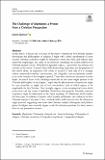Files in this item
The challenge of mysticism : a primer from a Christian perspective
Item metadata
| dc.contributor.author | Spencer, Daniel | |
| dc.date.accessioned | 2021-01-18T12:30:02Z | |
| dc.date.available | 2021-01-18T12:30:02Z | |
| dc.date.issued | 2021-01-14 | |
| dc.identifier | 272101319 | |
| dc.identifier | 417c9f08-3d2e-4469-8367-e551cbecc253 | |
| dc.identifier | 85099436782 | |
| dc.identifier | 000607754600001 | |
| dc.identifier.citation | Spencer , D 2021 , ' The challenge of mysticism : a primer from a Christian perspective ' , Sophia , vol. First Online . https://doi.org/10.1007/s11841-020-00822-4 | en |
| dc.identifier.issn | 0038-1527 | |
| dc.identifier.uri | https://hdl.handle.net/10023/21282 | |
| dc.description.abstract | In this article, I discuss the relevance of the study of mysticism for Christian analytic theologians and philosophers of religion. I begin with a brief consideration of some reasons Christian academics might be reluctant to enter this field, and indicate that, somewhat surprisingly, the study of mysticism is something but seldom addressed in Christian analytic circles. With this background in place, I proceed to the primary two sections of the article. Section I deals with demarcating mysticism: for the purposes of this article alone, an experience will count as mystical if and only if it is strongly unitive, transcends everyday consciousness, and (allegedly) conveys epistemic certainty as to the veracity of the insights acquired. These three criteria are discussed in some depth. Section II turns to the challenge mysticism in this sense might present to the Christian philosopher or theologian. I argue that the phenomenon of mysticism might be seen plausibly to imply one of two conclusions, both of which appear to be unpalatable for the Christian. First, it might suggest certain metaphysical views which prima facie call key tenets of orthodox Christianity into question. Secondly, mystical experience might be understood as the ‘inner meaning’ of Christianity which renders the better part of orthodox Christian belief equally problematic (as evidenced in three Christian mystics I discuss). I then conclude with a reflection on how the discussion might proceed, suggesting once more that Christian analytic theologians and philosophers of religion have scarcely begun to ask the relevant questions, let alone answer them in any persuasive manner. | |
| dc.format.extent | 19 | |
| dc.format.extent | 393592 | |
| dc.language.iso | eng | |
| dc.relation.ispartof | Sophia | en |
| dc.subject | Mysticism | en |
| dc.subject | Philosophu of mysticism | en |
| dc.subject | Analytic theology | en |
| dc.subject | Philosophy of religion | en |
| dc.subject | Christian mysticism | en |
| dc.subject | Comparative mysticism | en |
| dc.subject | Comparative religion | en |
| dc.subject | BR Christianity | en |
| dc.subject | BL Religion | en |
| dc.subject | T-NDAS | en |
| dc.subject | NIS | en |
| dc.subject.lcc | BR | en |
| dc.subject.lcc | BL | en |
| dc.title | The challenge of mysticism : a primer from a Christian perspective | en |
| dc.type | Journal article | en |
| dc.contributor.institution | University of St Andrews. School of Divinity | en |
| dc.identifier.doi | 10.1007/s11841-020-00822-4 | |
| dc.description.status | Peer reviewed | en |
This item appears in the following Collection(s)
Items in the St Andrews Research Repository are protected by copyright, with all rights reserved, unless otherwise indicated.

